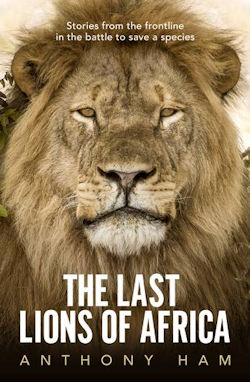SEJournal Online is the digital news magazine of the Society of Environmental Journalists. Learn more about SEJournal Online, including submission, subscription and advertising information.
BookShelf: “The Last Lions of Africa: Stories From the Frontline in the Battle To Save a Species”
By Anthony Ham
Allen & Unwin, $26
Reviewed by Melody Kemp
 |
As a child, I remember sitting in the dark theaters of afternoon matinees, enthralled as MGM’s mascot, Leo the Lion, roared his greetings with his head and mane protruding majestically from the film studio’s famous logo.
It was both challenging and majestic. Some movie-goers might have found it threatening. For others, it might have seemed like an invitation to dominate and kill.
When it comes to the road toward extinction, author Anthony Ham is on familiar turf. A traveler, photographer and journalist, his latest book, “The Last Lions of Africa: Stories From the Frontline in the Battle To Save a Species,” is a wonderfully written piece of journalism about a terrible subject.
Ham has a natural curiosity coupled with compassion. With both bravura and tenderness, cultural sensitivity and honesty, Ham’s writing is, of course, about a sad topic. But it exposes many of the myths that make extinction inevitable.
For instance, there’s the notion of sustainability. A horrible word, I wish we could expunge it from daily use as it gives tacit approval for destructive activities.
Trophy hunting is one such example. While attempts have been made to define trophy hunting as sustainable, bringing in all sorts of limitations, it assumes the animals recognize and obey borders, where one side offers sanctuary, the other offers death.
Cleverly, a lot of the hunting reserves are placed adjacent to protected areas. That this is allowed is a matter of concern.
Cecil, perhaps the most globally recognized lion, was a victim of this transboundary ruse (may require subscription). A dentist whose personal neurosis stretched to killing as many large animals as he could took Cecil’s life just outside the boundary.
Ham’s book quietly explains the complex social and
behavioral traits of lions that undercut the damage
to the animal’s social ecology brought about by trophy hunting.
Trophy hunting perpetuates the myth that it doesn’t risk the survival of a species. Ham’s book quietly explains the complex social and behavioral traits of lions that undercut the damage to the animal’s social ecology brought about by trophy hunting.
I like his writing style: straightforward and honest, warm and appreciative. He feels part of the scene rather than just being a visitor (he has lived outside of his native Australia for a significant period, and he only gives his background away in the acknowledgments, with a throwaway ‘Mate’).
Ham owns his fear at running out of water or fuel on the long desert tracks, and his contempt for trophy hunting is barely submerged. He does not shirk away from talking to victims of lion attacks. None seek vengeance, despite the nightmares and horror they experienced.
But his great tribute is to the San people who in popular culture are the bushmen. He makes the painful point that we can be equally persecuted by our own. Marginalized from traditional lands, these people who may be the only race older than the Australian Aboriginals are now disconnected from their ancestors.
They, along with the lions, face extinction.
Melody Kemp is a longtime SEJ member and a freelancer currently located in Australia.
* From the weekly news magazine SEJournal Online, Vol. 6, No. 8. Content from each new issue of SEJournal Online is available to the public via the SEJournal Online main page. Subscribe to the e-newsletter here. And see past issues of the SEJournal archived here.













 Advertisement
Advertisement 



